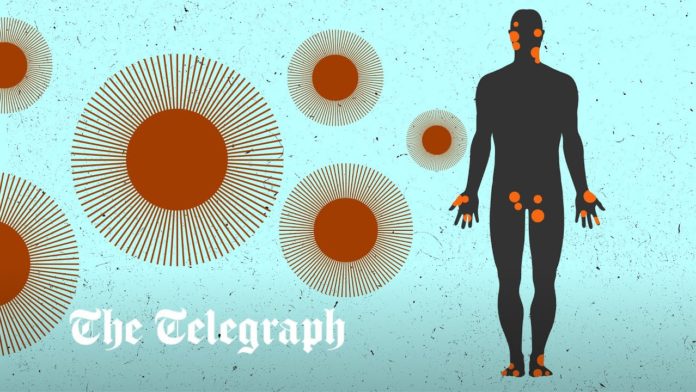
Monkeypox cases in the UK have exceeded 1,000 for the first time, with experts urging gay men to be wary of the virus ahead of more festivals and Pride this summer.
The vast majority of infections are in gay and bisexual men, while only five cases are reported to have been in women – as the condition is largely spreading via sexual interactions in the gay community.
The UK Health Security Agency (UKHSA) announced on Tuesday that the total number of monkeypox cases in the UK is now 1,076, an increase of 166 from the previous week.
A majority of the new cases were in England (162), with 69 in London – taking the capital’s tally to 659 and making it the epicentre of the British outbreak.
The majority of patients are between the age of 31 and 43, with the average age being 36, health experts added.
Data from the UKHSA go back to Sunday, June 26 and mean the global number of cases is now in excess of 3,500, with one known death and two cases in children.
Daniel Bausch is director of the United Kingdom Public Health Rapid Support Team and was recently part of the committee who decided not to make monkeypox a “public health emergency of international concern”.
“Monkeypox is yet another warning shot to the world,” he wrote in The Telegraph.
“The virus’ rapid spread in recent weeks has highlighted the very real threat posed by emerging new infections, and shone a harsh spotlight on major gaps in the global response to tackling disease.
“But although some parallels can be drawn to the coronavirus, monkeypox is almost certainly not the next Covid-19.”
Cases to increase
Dr Sophia Makki, incident director at UKHSA, said on Tuesday that cases are expected to continue increasing.
“The monkeypox outbreak in the UK continues to grow, with over 1,000 cases now confirmed nationwide,” she said.
“We expect cases to continue to rise further in the coming days and weeks. If you are attending large events over the summer or having sex with new partners, be alert to any monkeypox symptoms so you can get tested rapidly and help avoid passing the infection on.
“Currently, the majority of cases have been in men who are gay, bisexual or have sex with men. However, anyone who has had close contact with an individual with symptoms is also at increased risk.”
She also urged people to not go out to events or see friends if they have symptoms and to contact NHS 111 or their local sexual health clinic if they think they may be infected.
Alex Sparrowhawk, health promotion specialist at Terrence Higgins Trust, said on Twitter:
London Pride, the biggest event in the British LGBTQ calendar, is next weekend.
Vaccination campaign expanded
Health officials last week expanded the monkeypox vaccination campaign to gay men deemed to be at high risk of catching the disease, because they have sex with multiple partners or attend sex parties.
Criteria for the vaccine is similar to those who are given pre-exposure prophylaxis (PrEP) medication to stave off HIV and takes into consideration whether the individual has multiple sexual partners, engages in group sex, attends “sex on premises” venues or has recently caught a sexually transmitted infection.
The new strategy, published by the UKHSA, said: “JCVI proposed that vaccination should be offered as soon as feasible to GBMSM [gay and bisexual men who have sex with men] at highest risk due to a large number of contacts.
“In view of the current epidemiology and vaccine supply available, wider vaccination in low-risk GBMSM individuals or the general population is not advised at this time.”
The pre-emptive vaccine rollout aspect of the strategy is in addition to the existing “ring vaccination” plan, which uses contact tracing to identify those who have been in recent close contact with a known case.
Healthcare workers at specialist wards, close contacts of known cases and staff who clean the rooms of positive cases are all currently eligible for the vaccine.
But the update to the strategy will now expand the list of occupations eligible for the jab to include laboratory workers processing monkeypox tests, as well as hospital staff at non-specialist units treating infected patients.








